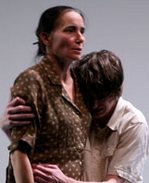SITE GUIDE
SEARCH
REVIEWS
REVIEW ARCHIVES
ADVERTISING AT CURTAINUP
FEATURES
NEWS
Etcetera and
Short Term Listings
LISTINGS
Broadway
Off-Broadway
NYC Restaurants
BOOKS and CDs
OTHER PLACES
Berkshires
London
California
New Jersey
Philadelphia
Elsewhere
QUOTES
TKTS
PLAYWRIGHTS' ALBUMS
LETTERS TO EDITOR
FILM
LINKS
MISCELLANEOUS
Free Updates
Masthead
A CurtainUp Review
Chair
|
I write about violence as naturally as Jane Austen wrote about manners.—
Edward Bond |

Stephanie Roth Haberle and Will Rogers
(Photo: Gerry Goodstein) |
Bond's influence on similarly inclined playwrights can currently be seen in the revival of Blasted playing at SoHo Rep (see review link below). That play by Sarah Kane, who committed suicide while still in ther 20s, is characterized by the same sort of violence and despair and is actually much harder to watch. However, Chair is more desolate and devoid of human interaction.
Chair involves Alice, a middle-aged recluse who's raising her childlike son Billy in a cramped two-room apartment in a large city. We see Billy intent on his colorful crayon drawings —which would be sweet, except that Billy is not a child, but twenty-six. What's more, he has never left the apartment since Alice found him in a rubbish bin and, rather than turn him in to the authorities, raised him out of anyone's sight. Billy longs to venture outdoors and grow up, but his inability to process the world leads to frequent childish temper tantrums. One day Alice sees a soldier at the bus stop across the street. He and the frail and sick prisoner with him have been waiting for the bus for some time. In an uncharacteristic burst of pity, Alice takes him a chair so that he can sit while waiting. This tiny act of kindness sparks a whirlwind of violence and recrimination and culminates in a terrifying visit from the Department of Welfare. it marks the end of Alice's and Billy's world as they know it.
Stephanie Roth Haberle, who has worked with director Robert Woodruff several times, plays Alice. Haberle, like her character, is closed down for the first part of the play. When she really opens up in her bitter goodbye scene, we see her true desperation and her longing for another world. I liked Will Rogers' performance as Billy more, even though his babyish petulance begins to grate. He too is finest in his final scene when he reveals a shimmering curiosity that is ill-suited to the real world. As Rogers plays this unwilling Peter Pan we see a man who yearns to grow up, but hasn't a clue how to do so and so his taking refuge in his simplistic drawings seems perfectly reasonable.
Robert Woodruff is the ideal director for Bond. The former artistic head of the American Repertory theater, earned his directorial chops in the '70s as the sole director of Sam Shepard, including the premieres of True West and Buried Child, the latter a play with the same sort of barely concealed brutality and the grim moral desolation as Chair. Woodruff has a masterful way with dystopias. He allowsBond's vision of a society "in a permanent state of alert" to unfold in a slow and surprising way. We don't get a true sense of the characters' world or the stakes involved, until the last scenes, which is exactly as it should be. Too often futuristic dramas attempt to explain the future at the beginning, and only then allow the story to develop.
While I suggested a drink to fortify yourself for seeing Blasted, save that drink for after you see the equally depressing if not as horrific to watch Chair. That said, don't let its lack of holiday spirit keep you away. Chair is one of the best plays I've seen this year, and a rare chance to see the work of a playwright whose work hasn't received a full-blown New York production in years.
Editor's Note: To the review of Blasted, also reviewed by Jenny, > go here. To read Curtainup's review of the 2001 production of Saved go here
|
Chair Written by Edward Bond Directed by Robert Woodruff With Stephanie Roth Haberle (Alice), Will Rogers (Billy), Alfredo Narciso (Soldier), Joan McIntosh (Prisoner), and Annika Boras (Officer) Set and Costume Design: David Zinn Lighting Design: Mark Barton Sound Design: Michael Attias Running Time: 90 minutes with no intermission Theatre for a New Audience, The Duke on 42nd Street, 229 West 42nd Street; 646-223-3010 Tickets $75 December 5-28 Reviewed by Jenny Sandman based on December 12th performance |
|
REVIEW FEEDBACK Highlight one of the responses below and click "copy" or"CTRL+C"
Paste the highlighted text into the subject line (CTRL+ V): Feel free to add detailed comments in the body of the email. |






